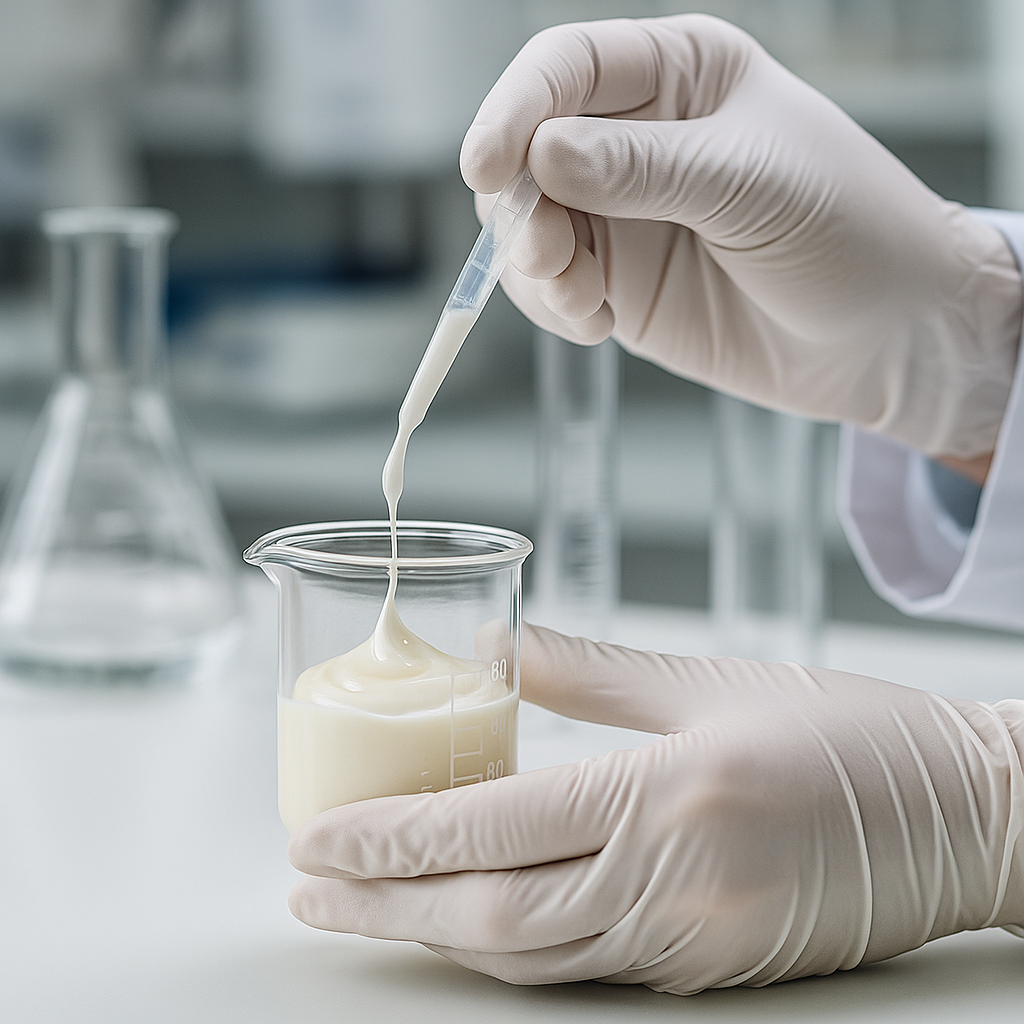
Singapore’s Greenitio has closed a $1.5 million seed funding round to turn mushroom-based chitosan into functional biopolymers for cosmetics and specialty chemicals.
A biotech startup from Singapore has attracted $1.5M from investors to scale up its bipolymer platform, powered by chitosan derived from mushrooms, and drive a shift away from microplastics and petrochemicals in various industries.
Greenitio, which will use the seed funding to accelerate its path to commercial readiness, is targeting the cosmetics and specialty chemicals sectors first, which contributed to the round. It was led by SGInnovate, with additional participation from Better Bite Ventures, Silverstrand Capital and existing backers.
“Emerging technologies remain a focal point in the global push towards decarbonisation, catalysing the development of novel solutions that enable a more sustainable future,” said Hsien-Hui Tong, executive director of investments at SGInnovate. “Having developed cleaner alternatives to ingredients used in major global industries, Greenitio is one such company at the forefront of this pursuit.”
The fresh capital will help Greenitio scale up manufacturing, advance regulatory approvals, and expand commercial partnerships with global cosmetics and chemical companies.
“This fundraise gives us the runway to move from lab-scale proof to real-world deployment, supported by strong interest from formulation, sustainability and innovation teams across both the personal care and industrial value chains,” said Khan.
Mushroom-based chitosan makes up the bulk of Greenitio’s biopolymers

Founded in 2021 by CEO Amit Kumar Khan and CTO Susmita Roy, Greenitio has developed a patented green chemistry platform to replace plastics with high-performance bipolymers. It leverages computational modelling and bio-based feedstocks to create molecules in an aqueous medium at ambient temperatures without using toxic chemicals, organic solvents or generating waste.
These materials can directly replace commonly used plastic ingredients in cosmetic, personal care, home care, and specialty chemical products. The backbone of its technology is the fungal chitosan. It is conventionally made by treating chitin, a sugar found in the exoskeletons of shellfish and crustaceans, with an alkaline substance, and is known for its biodegradable and non-toxic properties.
Greenitio’s mushroom-derived chitosan makes up 50-99% of its biopolymers, with the rest of the composition made up by functional plant-based ingredients. The company confirmed that its materials are 100% bio-based and can degrade naturally in open-air conditions.
Its process functionalises the chitosan through controlled green chemistry to create derivatives that “behave very differently from native chitosan”, COO Didier Vermeiren told Green Queen. “We have materials that work across both water- and oil-based systems and act as true drop-in replacements for petrochemical polymers,” he said.
Its water-based production process eliminates chemical waste, lowers the carbon footprint by 87% compared to conventional chemistry, and delivers ingredients roughly three times cheaper than comparable bio-based alternatives.
The biopolymers are cationic and tunable, and can be seamlessly incorporated into water-soluble, oil-dispersible, and emulsion-compatible formulation systems. They also boast SPF-boosting, film-forming performance, water-resistant and anti-inflammatory properties, deep moisturisation benefits, and active ingredient delivery.
Why Greenitio’s biopolymers need regulatory clearance

Greenitio has three flagship bipolymer lines, all listed in the International Nomenclature of Cosmetic Ingredients and registered with the Inventory of Existing Cosmetic Ingredients in China (IECIC).
Chitosola enhances suncare and skincare formulations, Chitobela is an anti-ageing and anti-acne polymer designed for luxury skincare and haircare regimes, and Chitobe adds nourishing effects to skincare and boosts UV protection in sunscreen products. In addition, the startup makes alkyl-amino-acid-based biosurfactants and microcapsules derived from plant proteins.
“We are material-agnostic and source from trusted suppliers in different regions, selecting the grade based on application and customer requirements. Over time, we aim to bring extraction in-house to further secure supply and control quality,” said Vermeiren.
The plastic industry is responsible for 3.4% of global emissions, a share that will only increase as production triples by 2060. And despite 430 million tonnes of plastic waste being generated globally every year, only 9% is recycled. This is an enormous problem since plastic takes between 20 and 500 years to break down, populating landfills and leaking microplastics into our soil and water supply.
Certain single-use plastics have been banned in the UK and US states like California. The EU, meanwhile, is set to ban over 500 microplastics and polymer ingredients by 2027, 90% of which have no viable alternatives today, according to Greenitio. The startup says that its biopolymers meet that need, but they will need regulatory approval before launching into the market.
“Any new personal care/cosmetic ingredient must be registered before use to ensure it’s safe, non-toxic, and compliant with local regulations. Once approved, brands can confidently use it in their products worldwide,” said Vermeiren.
“In practice, this means compiling a safety and technical dossier (toxicology, stability, etc.) and submitting it to authorities or industry bodies depending on the region — for example, the IECIC in China, the Personal Care Products Council in the US, or REACH in Europe. Once accepted, the ingredient is listed on the relevant inventory, and brands are free to formulate it into their products,” he added.
“Because these ingredients are applied directly on the skin, regulators want to be certain they are safe and non-toxic. Registration also helps brands de-risk their product launches by ensuring global compliance.”
Greenitio to expand manufacturing and set up Benelex subsidiary

“We currently operate out of Singapore, where we have established R&D, lab-scale and pilot production facilities. Our pilot line supports supply from grams to kgs for customer testing and early commercial use,” Khan told Green Queen. “For industrial scale, we are working with a toll manufacturer in India, where we have the ability to scale towards 25 tonnes per month.”
To meet growing demand from European partners, it will establish a subsidiary in Benelux. This hub will leverage the region’s central location and strong chemical and cosmetics ecosystem to support collaborations and commercial scale-up across Europe.
The company is already developing bespoke derivatives of its biopolymers for clients, with testing agreements in place with global beauty and personal care giants and major ingredient suppliers. Khan declined to name the partners, though he noted that they span “leading multinationals across cosmetics, personal care, fragrance, and specialty chemicals”.
“Our focus is on formulators and ingredient suppliers in cosmetics, personal care, and home care, particularly those seeking high-performance, bio-based alternatives to petrochemical or microplastic ingredients,” he said.
The Singapore startup says its biopolymers pose an advantage over competing products on one key component: price. “Our biopolymers are specialty ingredients, priced to competitively replace both synthetic petrochemicals and costly underperforming natural alternatives,” said Khan.
“In practice, our materials are significantly more affordable than current natural substitutes while delivering several times better performance. Because of our green chemistry, we can use conventional bioreactors and don’t require specialty equipment that most biotech startups need, allowing us to produce cost-effectively.”
Greenitio is one of a handful of companies relying on animal-free chitosan. Brooklyn-based TômTex’s Series M leather alternative uses mushroom-derived chitosan. Chibio Biotech combines mushrooms with Aspergillus niger (a type of black mould), and UK-applicance leader Dyson is exploring oyster mushroom chitosan for new haircare products.
The post Singapore Startup Greenitio Raises $1.5M for Plastic-Free Cosmetics with Mushroom-Derived Chitosan appeared first on Green Queen.
This post was originally published on Green Queen.